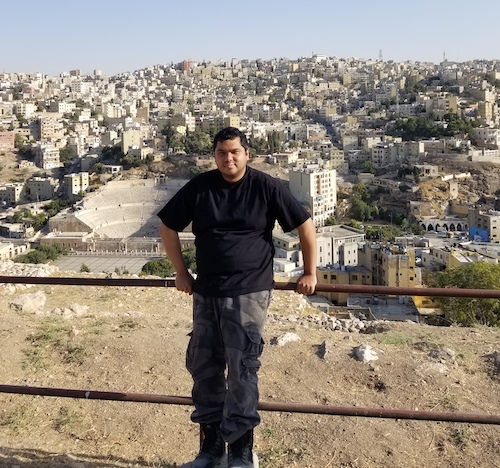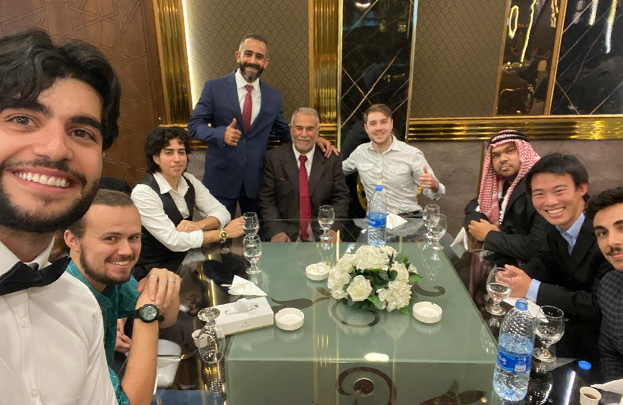Nabil Rahman in Jordan. Image courtesy of author.
Student organizations provide you with the opportunity to maximize your educational experience by participating in extracurricular activities, networking with like-minded peers and acquiring useful skills. But how do you do that in online education?
Thanks to technology, joining student organizations and participating in extracurricular activities is very easy. The University offers over 74 different student organizations that meet on a regular basis and are devoted to helping their members develop collaboration and leadership skills.
Talking with a University Student about Extracurricular Activities and Student Organizations

Nabil Rahman is a current student who is working on a bachelor’s degree in international relations and global security from the University. He is a participant in several student organizations, including:
- Model United Nations Club
- Society for Defense and Strategic Studies
- Order of the Sword and Shield Honor Society
- National Security Policy and Analysis Organization
I recently sat down to talk with Nabil Rahman about his experiences in the University’s student organizations and how extracurricular activities in those student organizations have benefited his educational experience.
Dr. Fuchs: What brought you to the University?
Nabil: I started my academic career in a community college. I was considering going on to higher education, but I was also thinking about joining the military.
I decided to go to AMU because of its strong, military-related courses and its flexible schedule that allows me to both work and take courses. The University accepted my transfer credits, and I decided that my major would be international relations and global security.
Dr. Fuchs: Where are you now in your educational journey?
Nabil: I expect to graduate this year. I started in January as an intern for the Department of State, and it has been a great experience. I am a civil servant, and I am thinking about joining the foreign service.
Dr. Fuchs: How did the skills you acquired at the University help you get this opportunity to work for the Department of State?
Nabil: The courses I took at the University gave me a unique perspective about international relations and global security, but my membership in student organizations were also very important. I was the president of the Model United Nations Club after serving as an officer in many other roles for three years, and I am also an officer in the Society for Defense and Strategic Studies.
Dr. Fuchs: What skills did you get from your experience in the Model United Nations Club?
Nabil: I participated in seven Model U.N. conferences, all focusing on real global issues. One conference was the United Nations Security Council, including the national model United Nations, which has teams from all over the world. About 1,500 students come to this conference from places like Russia, Vietnam, and various U.S. states, and they gather in Washington, D.C. for three days.
I gained invaluable skills from this experience. Presentation skills are at the heart of the conference, but I also learned to draft complex documents as we drafted U.N. resolutions that we negotiated.
Dr. Fuchs: What has been your experience in the Society for Defense and Strategic Studies?
Nabil: I am an officer who creates training materials for members to help them develop the skills to enter the Intelligence Community. We conduct training workshops that teach skills like drafting memos for senior leaders and using open-source tools to gather intelligence.
Our webinars include assessments and work assignments that help members put concepts, skills, and resources into practice. They allow members to utilize these skills before they enter the workplace.
Dr. Fuchs: How did you convey the many skills and knowledge gained from your membership in student organizations to the recruitment officers in the Department of State?
Nabil: By participating in these student organizations, I showed the State Department that I had a real commitment to the field of international relations, diplomacy and intelligence. By serving as a student organization officer, I acquired leadership experience and organizational skills that can be used in project management.
Working as an Intern in Washington, DC
Dr. Fuchs: In 2021, you worked as an intern for the Osgood Center for International Studies in Washington, D.C. Was that your first internship?
Nabil: No. The Osgood Center is a nonprofit educational program, and I interned there as a program associate.
I gained a lot of knowledge from my internship. I drafted memos on various global issues, attended think tank events like Brookings and Hudson Institute and reviewed the most recent publications on foreign policy circulating in Washington, D.C.
In 2023, I was a research intern for Leading Point Management Advisory Services, spending a semester in Amman, Jordan. This experience served as an Arabic immersion program. It is a program where no other language is allowed to be spoken but the one you learn, which is challenging experience but very useful.
Studying Abroad in Jordan
Dr. Fuchs: What other experiences did you have during your time at the University?
Nabil: I applied to a China Educational Tours program and was accepted. I had to provide a transcript of my grades and a letter of recommendation from a language professor. It gave me the opportunity to participate in a study abroad program in Jordan.

Dr. Fuchs: What are your plans once you graduate from the University?
Nabil: I plan to take my GRE – the Graduate Record Examination – so I can apply for an M.A. in international relations, which will enhance my skills and enable me to pursue different career options. I plan to apply for several graduate programs in the D.C. area, since they are the leading programs in the field.
Student Organizations and Extracurricular Activities
Nabil’s experience at the University is a great example of how participating in student organizations and extracurricular activities such as the Model UN Conference can help you to grow useful business skills. Extracurricular activities are an important part of your educational journey and taking them seriously directly impacts the skill sets you develop.
